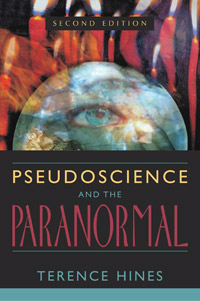This book was required reading for “Why We Believe Weird Things: Science and Pseudoscience in Psychology” taught by Dr. Jeffrey Brookings and for “Parapsychology & the Occult” taught by Dr. Terence Hines.
Popular culture fills the mind with a steady diet of fantasy, from tales of UFO landings and alien abductions, haunted houses, and communication with the dead to claims of miraculous cures by spiritual healers and breakthrough treatments in ‘alternative’ medicine. The paranormal – and the pseudoscience that attempts to validate it – is so ubiquitous that many people lose sight of the distinction between the real and the imaginary, and some never learn to make the distinction in the first place. In this updated and expanded edition of “Pseudoscience and the Paranormal”, the most comprehensive and up-to-date work of its kind, psychologist and neuroscientist Terence Hines explores the question of evidence for the paranormal and delves beyond it to one that is even more puzzling: Why do people continue to believe in the reality of the supernatural despite overwhelming evidence that it does not exist? Devoting separate chapters to psychics, life after death, parapsychology, astrology, UFOs, faith healing, alternative medicine, and many other topics, Hines examines the empirical evidence supporting these popular paranormal and pseudoscientific claims. New to this edition are extended sections on psychoanalysis and pseudopsychologies, especially recovered memory therapy, satanic ritual abuse, and facilitated communication. Also included are new chapters on ‘alternative’ medicine and environmental pseudoscience. Critiquing the whole range of current paranormal claims, this carefully researched, thorough review of pseudoscience and the paranormal in contemporary life shows readers how to carefully evaluate such claims in terms of scientific evidence. This scholarly yet readable volume is an invaluable reference work for students and general readers alike.
Resource type: book recommendations
Academic discipline: freshman foundation and general education • psychology
Academic level: college and university









